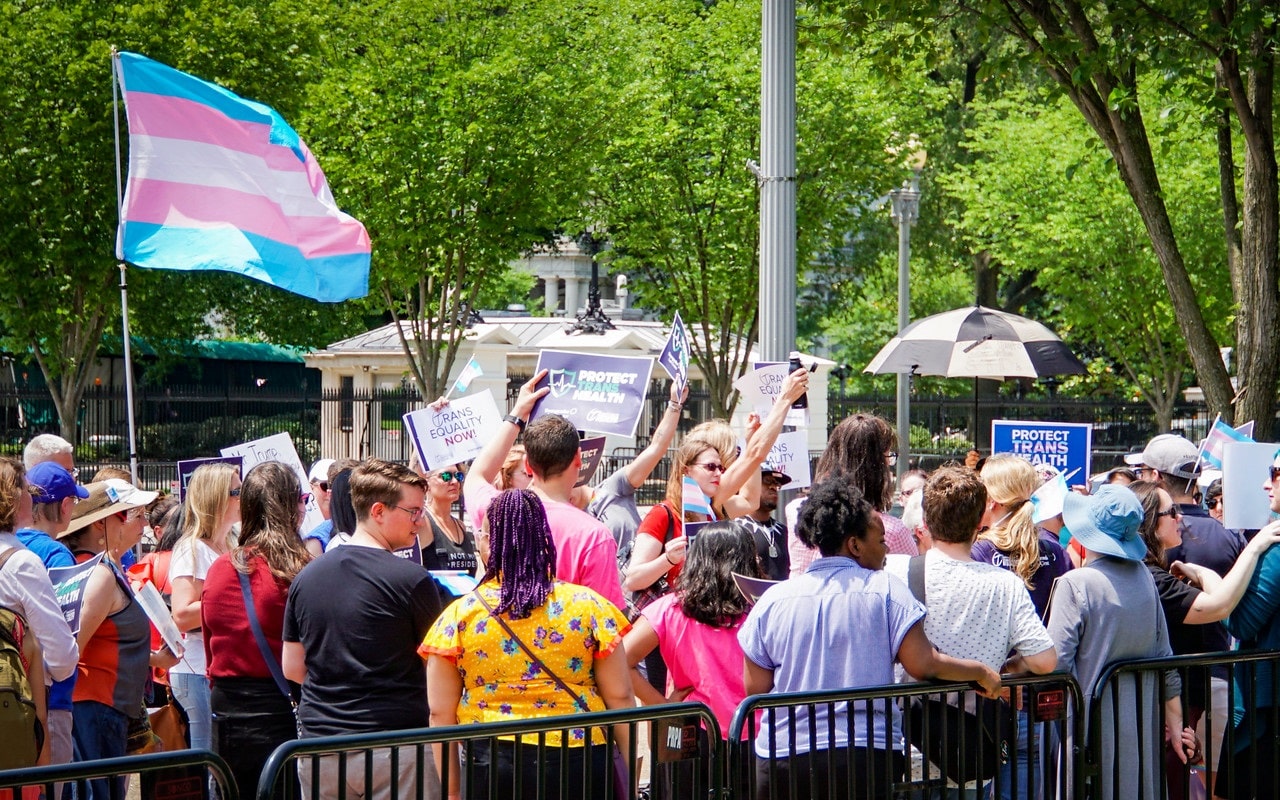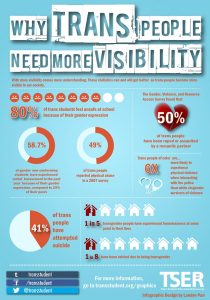
Trans Day of Visibility is celebrated every year on March 31. Trans Day of Visibility is a day to celebrate the contributions and further increase representation of Trans folks in all areas of society around the world. The first celebration was in 2009 and was created as a counterpoint to Trans Day of Remembrance, which was specifically to honor those Trans folks who had been murdered. The founder of Trans Day of Visibility was Rachel Crandall of Michigan, a Trans activist. The Trans Student Educational Resource, a youth advocacy group, has spearheaded the celebration every year since.
Why is Trans Day of Visibility Important?

Trans Day of Visibility raises awareness of these issues locally and around the world, where being Transgender, or living outside the gender binary, is illegal and punishable. Trans folks of color also experience a higher rate of homelessness, health issues, and are targeted by violence more than white Trans folks. For many Trans folks, seeing stories that reflect their own or for Trans folks who are only starting to discover who they are, seeing representation of folks thriving in real life, on the page, or on screen is an important source of support. Trans Day of Visibility invites Trans folks of all types—trans, non-binary (NB), or genderqueer/fluid - to celebrate themselves, each other, and use the opportunity to push for more equal rights, treatment, and access to services in their cities, states, and countries. With the dramatic and continual scaling back of Trans rights in the last half-decade, many Trans folks continue to fear for their health and their lives as health care and social support are severely limited, if at all available.
The T of LGBTQIA+
Unlike the other letters, Transgender refers to someone’s gender identity and does not reflect an individual’s sexual or romantic preference. Gender is not related in any way to biology or physiology, but is someone’s personal identity and/or external expression. Someone assigned male at birth could identify as a woman and express their gender identity as a woman. The same goes for someone assigned female at birth, who identifies as a man. There are folks who also simply don’t identify as either gender, and many identify either as non-binary (their gender identity being outside the binary of male and female, man and woman) or genderfluid/genderqueer (their gender identity and expression ever changing). Those whose sex assigned at birth aligns with their gender expression/identity are cisgender. Still confused about gender? It is a complex concept. The folks at Trans Student Educational Resources have created a very helpful graphic called The Gender Unicorn to help break down gender identify and expression.
How can I show support for the Trans community?
One of the small, but greatly important, ways you can show your support is share your pronouns, like you would share your name. Making this an everyday occurrence creates a safe space for others who might identify as Trans or non-binary to share theirs and avoid the anxiety of being misgendered (being referred to by the incorrect gender). A simple “Hi! My name is _____ and my pronouns are ____.” You might think it’s obvious that if you identify as a man, who has a traditionally male name, that you use he, him, and his pronouns, but that’s not always so obvious for everyone else. Creating this safe space in social and especially work environments is an important way you can support those in the Trans community. But, please understand: no one owes you their story. If someone comes out to you as Trans, they don’t owe you any additional information, unless they choose to share it. Asking questions about their physical bodies, what their name used to be (known as a “deadname”), what they were like before they transitioned, if they’ve had or are going to have surgery, and the like is never okay. However, asking questions such as “Is it safe to use your name and pronouns you shared with me around everyone?” is a very helpful question. This question is especially important for youth and teens who might not be out with their family and it could be unsafe. It’s OK to make mistakes because you are going to make mistakes. If you do make a mistake and are corrected, simply apologize and thank the person for correcting you, and correct your mistake. As long as you start from a place of compassion and respect, you’ll figure it out.
Outside of that, support of the Trans community can come in a variety of ways! Being an ally means listening, supporting, and lifting up Trans lives, voices, and stories. It means supporting and pushing for equal rights to life and health under the law for Trans folks. Education and empathy can be built by experiencing the variety of Trans experiences through story. It’s never too early to celebrate Trans stories.
For Younger Readers
For Older Readers
Online Resources Too
Learn more about the history of LGBTQIA+ community and the fight for LGBTQIA+ rights by checking out our Global Encyclopedia of Lesbian, Gay, Bisexual, Transgender, and Queer (LGBTQ) History and Defining Documents in American History - LGBTQ+ (1923-2017) online resources.
Celebrate!
Trans folks and allies of Trans folks can celebrate in a variety of ways! In 2021, celebrations are still happening virtually. Check out Santa Clara Office of LGBTQ Affairs for event and programs related to Trans Day of Visibility. The Billy de Frank LGBTQ Community Center will be hosting their Trans Day of Visibility with a variety of speakers and virtual resource booths, via Zoom, and even a show in the evening!


Add a comment to: Celebrating Trans Day of Visibility